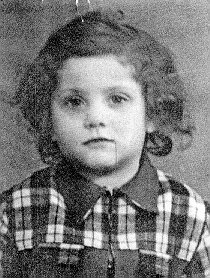Strong Bonds and Promises To Take Care
of Each Other Kept Them Alive!

Hertha Gross Rothenberg Myers
This is part of an ongoing series of interviews with deaf survivors of the Holocaust during World War II. This personal interview took place in early 1994.
Hertha who is deaf was very fortunate to have a hearing sister, Renee because without her help to get around the camps, she would not be alive today.
Bom in Bratislava, Czechoslovakia in 1935 to deaf parents, Henrietta Benedikt and Julius Gross. She had a deaf grandfather Jeno Benedikt and a hearing grandmother, Sarah, who were killed in the camps. They also have a deaf uncle, Marcel Benedikt who moved to Israel before the war broke out. They spoke in German sign language.
 During the Nazi occupation in 1939, Czechoslovakia was partitioned, and Slovakia, a Province became an independent state with the help of the Nazis forces. The Slovak government cooperated with the Germans and helped round up Jews who were then sent to extermination and labor camps. Every Jewish family had to move into another family’s home within the ghetto. Henrietta Gross and Ludovik Wurmfeld had been schoolmates as children in Vienna. The Gross family took in Ludovik, his wife Frieda and their baby girl, Cecelia. Shortly there after, Hertha and Renee were sent into hiding on a farm. Frieda moved in to a gentile neighborhood with false papers. Henrietta and Julius were deported. Six months later, Frieda and Ludovik were also deported.
During the Nazi occupation in 1939, Czechoslovakia was partitioned, and Slovakia, a Province became an independent state with the help of the Nazis forces. The Slovak government cooperated with the Germans and helped round up Jews who were then sent to extermination and labor camps. Every Jewish family had to move into another family’s home within the ghetto. Henrietta Gross and Ludovik Wurmfeld had been schoolmates as children in Vienna. The Gross family took in Ludovik, his wife Frieda and their baby girl, Cecelia. Shortly there after, Hertha and Renee were sent into hiding on a farm. Frieda moved in to a gentile neighborhood with false papers. Henrietta and Julius were deported. Six months later, Frieda and Ludovik were also deported.
When the war started, Henrietta and Julius Gross paid a couple to hide their two girls, Hertha and Renee and to protect them. When the parents were deported and didn’t pay the couple, the girls returned and were caught and learned that their parents had been deported to Auschwitz. Hertha and Renee was sent to Bergen-Belsen concentration camp for a year.
After the war was over, they found out that their parents had been killed.
They stood in line for hours wearing their only dress that they had been wearing since they were taken to the camp. They had to get up at 4 A.M. and stood in line until 7 A.M then they had only black coffee with one slice of bread for breakfast, lunch & dinner, they had only turnips (sometimes carrots) with a watery sauce daily. One day Hertha witnessed a woman trying to escape and an officer shot her from the blockhouse. She fell and died. Her feet were barefoot which scared her.
Being children, both girls watched the other prisoners bring all the dead bodies and pile them up in front of them. They were left there until the war ended.
It was impossible to escape because of the electric wires around the fence. Renee started to lose her will to live and was ready to give up but Hertha gave her support and at the same time she remembered that she promised their parents that she would look after Hertha.
They didn’t have numbers on their arms because Bergen Belsen did not use tattoos.
The day before the war was over, Renee told Hertha, There will be a big surprise tomorrow.” She was shocked to learn that they were free.

They were sent to a group home in Sweden after being examined to make sure that they had no communicable diseases to spread. Hertha attended Manila Dovstumskolm, a school for the deaf in Stockholm while her hearing sister went to Helsingborg. After two long years of red tape due to Hertha being deaf, their relatives were able to get them. They found out they were still alive through the Hebrew Immigration Aid Society (HIAS). A cousin came to Sweden to make arrangements to bring them to the United States in 1948.
When they arrived in the U.S. they lived in the heart of the Hassidic community in Williamsburg and her relatives met a deaf couple. They recommended that they send Hertha to Lexington School for the Deaf. She went there for three years and learned English.
She started to work at the Defense Connect with Electric and met her husband, Herbert Rothenberg. Then she got a new job with the Fireman Insurance Fund and then left to raise three deaf children, Ira, Hetty and Sara. After being widowed, she returned to work after the kids were older at J. P. Morgan & Guaranty Co. until she took early pension and is now making her residence in Henderson, Nevada. A proud grandmother of two grand sons, Justin and Sven.

Of course, if she had a choice, she would trade her small lifetime compensation from the Germany Government to have her parents alive.




